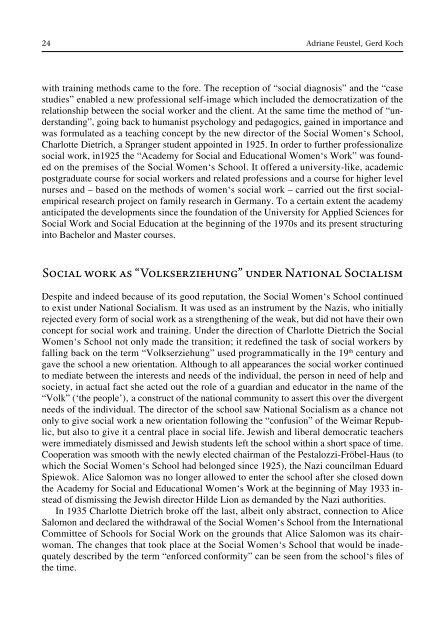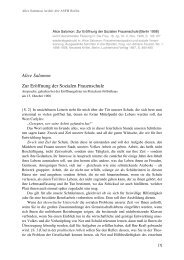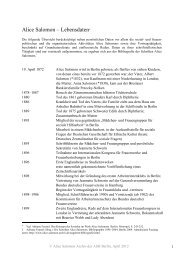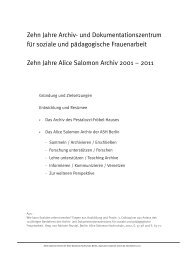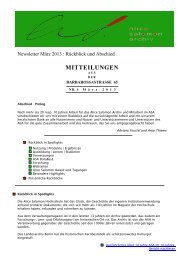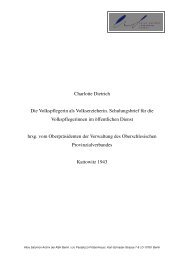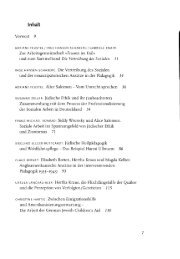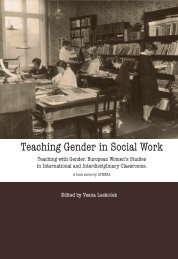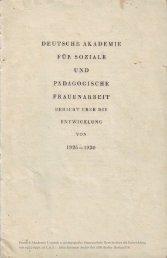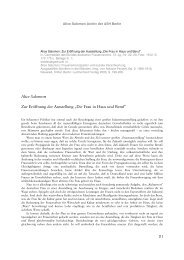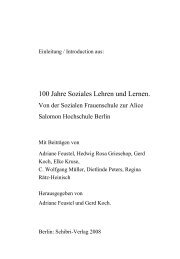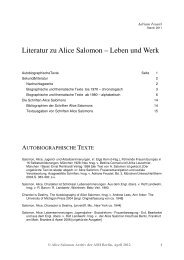100 Jahre Soziales Lehren und Lernen. - Alice Salomon Archiv
100 Jahre Soziales Lehren und Lernen. - Alice Salomon Archiv
100 Jahre Soziales Lehren und Lernen. - Alice Salomon Archiv
Create successful ePaper yourself
Turn your PDF publications into a flip-book with our unique Google optimized e-Paper software.
24 Adriane Feustel, Gerd Koch<br />
with training methods came to the fore. The reception of “social diagnosis” and the “case<br />
studies” enabled a new professional self-image which included the democratization of the<br />
relationship between the social worker and the client. At the same time the method of “<strong>und</strong>erstanding”,<br />
going back to humanist psychology and pedagogics, gained in importance and<br />
was formulated as a teaching concept by the new director of the Social Women‘s School,<br />
Charlotte Dietrich, a Spranger student appointed in 1925. In order to further professionalize<br />
social work, in1925 the “Academy for Social and Educational Women‘s Work” was fo<strong>und</strong>ed<br />
on the premises of the Social Women‘s School. It offered a university-like, academic<br />
postgraduate course for social workers and related professions and a course for higher level<br />
nurses and – based on the methods of women‘s social work – carried out the first socialempirical<br />
research project on family research in Germany. To a certain extent the academy<br />
anticipated the developments since the fo<strong>und</strong>ation of the University for Applied Sciences for<br />
Social Work and Social Education at the beginning of the 1970s and its present structuring<br />
into Bachelor and Master courses.<br />
Social work as “Volkserziehung” <strong>und</strong>er National Socialism<br />
Despite and indeed because of its good reputation, the Social Women‘s School continued<br />
to exist <strong>und</strong>er National Socialism. It was used as an instrument by the Nazis, who initially<br />
rejected every form of social work as a strengthening of the weak, but did not have their own<br />
concept for social work and training. Under the direction of Charlotte Dietrich the Social<br />
Women‘s School not only made the transition; it redefined the task of social workers by<br />
falling back on the term “Volkserziehung” used programmatically in the 19 th century and<br />
gave the school a new orientation. Although to all appearances the social worker continued<br />
to mediate between the interests and needs of the individual, the person in need of help and<br />
society, in actual fact she acted out the role of a guardian and educator in the name of the<br />
“Volk” (‘the people’)‚ a construct of the national community to assert this over the divergent<br />
needs of the individual. The director of the school saw National Socialism as a chance not<br />
only to give social work a new orientation following the “confusion” of the Weimar Republic,<br />
but also to give it a central place in social life. Jewish and liberal democratic teachers<br />
were immediately dismissed and Jewish students left the school within a short space of time.<br />
Cooperation was smooth with the newly elected chairman of the Pestalozzi-Fröbel-Haus (to<br />
which the Social Women‘s School had belonged since 1925), the Nazi councilman Eduard<br />
Spiewok. <strong>Alice</strong> <strong>Salomon</strong> was no longer allowed to enter the school after she closed down<br />
the Academy for Social and Educational Women‘s Work at the beginning of May 1933 instead<br />
of dismissing the Jewish director Hilde Lion as demanded by the Nazi authorities.<br />
In 1935 Charlotte Dietrich broke off the last, albeit only abstract, connection to <strong>Alice</strong><br />
<strong>Salomon</strong> and declared the withdrawal of the Social Women‘s School from the International<br />
Committee of Schools for Social Work on the gro<strong>und</strong>s that <strong>Alice</strong> <strong>Salomon</strong> was its chairwoman.<br />
The cha nges that took place at the Social Women‘s School that would be inadequately<br />
described by the term “enforced conformity” can be seen from the school‘s files of<br />
the time.


